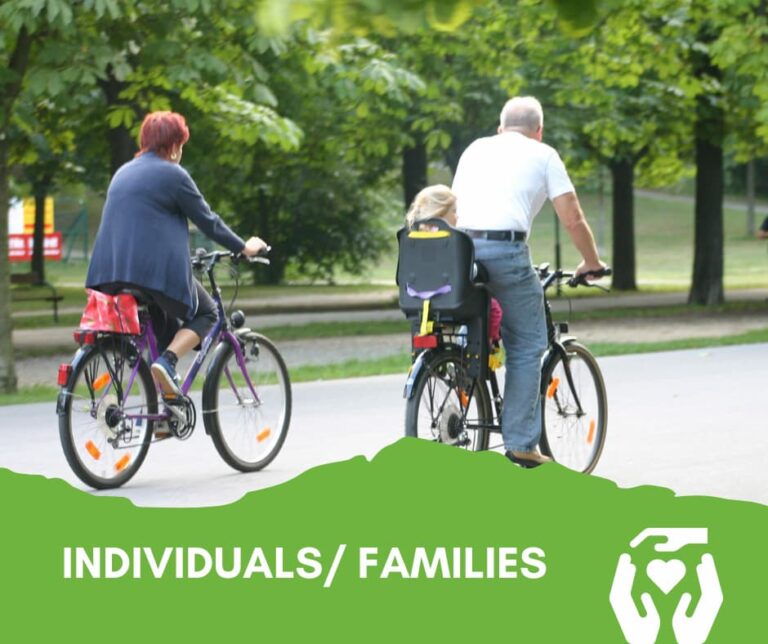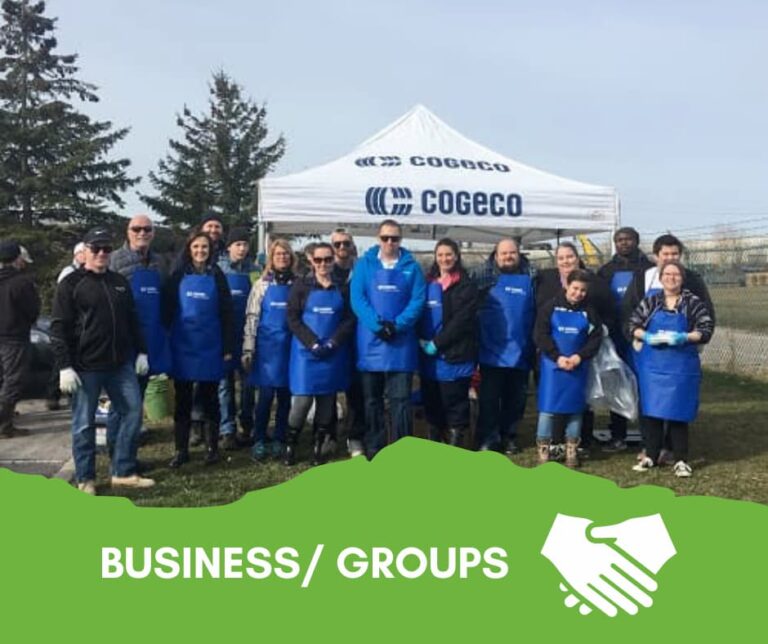 The great thing about caring for the environment is that all of us can make a significant difference right at home, school, work, or in the community, by re-thinking and changing our daily habits.
The great thing about caring for the environment is that all of us can make a significant difference right at home, school, work, or in the community, by re-thinking and changing our daily habits.
One step at a time, old habits you never questioned before can be replaced by routines that are more eco-friendly. Once you adopt a new habit, move on to another one so that it becomes part of an ongoing journey to support a greener, healthier life.
Check out Make the Switch to help you adopt more sustainable options and purchasing choices to lower your carbon footprint. And head over to our Smart Communities resource to learn more about building sustainable communities and “15-minute Cities“.
Share YOUR Eco-Actions with is by clicking on the logo!
Check out these two videos of local homeowners who are making a positive difference with their home and lifestyle switches!
Our top 10 tips to help you LIVE green!
1. Use less fuel
Drive less. Walk, bike, carpool, use transit. Fly less. Buy a hybrid or electric vehicle. Avoid idling.
2. Turn down the heat & reduce AC use
Save energy and GHGs in winter. Wear a sweater. Fix building drafts and areas of heat loss. Conserve energy and reduce GHGs in summer. Turn AC off and use fans. Draw the blinds on sunny windows to keep heat out.
3. Buy energy-efficient products
Look for Energy Star or similar certifications on appliances and electronics. Invest in a heat pump.
4. Turn off the lights & avoid phantom energy
Turn off lights, not in use. Use energy-saving bulbs (eg. LED, CFL). Unplug electronics and chargers, not in use. Use your power bar switch for convenience. Power down computers when not in use.
5. Adjust your eating habits
Eat less meat. Eat locally produced food. Buy organic. Say “No” to bottled water. Visit our local food resource to discover more.
6. Practice the 8 R’s of Low Waste Living
Buy less stuff. Buy used. Repair and reuse. Recycle and compost often and correctly. Get tips and resources here.
7. Plant Pollinators & Trees
Help to grow Burlington’s tree canopy and strengthen local biodiversity by greening up at home.
8. Shop Local Buy Green
Every dollar we spend is a vote for the type of world we want to live in. And as consumers, we have more power than you may think. Shop local and choose green options, and you’ll often save money too!
9. Use fewer paper products
Print less. Switch to e-statements. Buy recycled or sustainable forestry certified products (eg. FSC, SFI).
10. Conserve/protect water
Replace your lawn with drought-tolerant ground cover. Use rain barrels. Fix leaks. Use eco-friendly cleaners. Dispose of household chemicals for free at the hazardous waste depot.
VIDEO RESOURCES
- Waste Sorting At Home: Check out this video and find out how to sort a variety of your household items and learn some important tips to increase your recycling efficiencies at home! Related Links: Halton Region Waste & Recycling
- Recycling Bin Tips for Litter Control: A surprising amount of litter found in our local communities and parks actually come from our very own recycling bins. Check out this video for useful tips and reminders on how to manage your recycling and keep recycling in your bin.
- Sorting Plastic: Learn how to sort common household plastics while learning how to reduce your plastic consumption and waste. Check out upcycling plastic bag activities HERE
- Tackling Take-Out Waste: Ordering take-out or delivery is a great option when we are short on time, short on food or want to support local business. Check out this video and find out how to sort your take-out waste!
- Washroom Waste Sorting Tips: Are you properly sorting the waste created in your bathroom? Check out this video and learn how you can increase your waste diversion efficiencies in your bathroom.
- Composting and Green Cart Tips: Using the Green Cart is a great way to participate in large scale composting, though the quality of the compost is only as good as our efforts are at home. Check out this video for useful tips and reminders to get your Green Cart compost in tip-top shape.
- Vermicomposting
- Backyard Composting
- DIY Zero Waste Self Care Products: Learn how to make waste-free and all-natural self-care products with common items in your pantry. Chantelle shares her three favourite edible wellness products; natural teeth whitening and toothpaste, moisturizing hair treatment and body scrub.
- Nature-Friendly Burlington: An initiative connecting more of the community to local green space, stewardship opportunities and to a multitude of benefits nature experiences provide!
- Upcycled Bird Feeders: Turn your trash into treasure in this exciting hands-on upcycling workshop, perfect for children (age 8+) and adults alike. You will need a milk or juice carton, string, scissors, hot glue gun and any combination of paint, fabric or other materials for decorating.
- Backyard Gardening for Pollinators: Learn about the importance of pollinators, why we need them and how we can help our pollinators through this interactive webinar! Restore habitat in your backyard through planting Native Ontario plants that pollinators love, like Milkweed, Black-Eyed-Susans and Native Coneflowers.
- Removing Garlic Mustard: Keep an eye out for this pesky invasive species in your backyard and garden and learn how to safely remove it at home.
- Native Plants & Container Gardening with Ryan the Botanist: Native plants are easy to grow, are an excellent option for container gardening and are essential to our pollinators. Kayla and Ryan the Botanist display how you can encourage biodiversity by creating a simple and easy container garden set-up that is suitable for backyards and balconies. Don’t miss these tips!
- Nature Scavenger Hunt: This activity is wonderful for children (and adults too!) and can be done in your neighbourhood, backyard or even from your porch or balcony. Get outside, stretch your legs and get ready to spot nature!
- Central Park Community Garden Tour with Adria from Grow A Row: Central Park Community Garden is located 2299 New Street, behind the Central Public Library. To learn more about community gardens in the City of Burlington, visit their website here for more information.
- Maple Park Community Garden Tour with Lisa from The Burlington Food Bank Garden: Maple Park Community Garden is located 750 Maple Avenue. To learn more about community gardens in the City of Burlington, visit their website here for more information.
- Francis Road Bikeway Community Garden Tour with Michelle from the City of Burlington: Francis Road Bikeway Community Garden is adjacent to Francis Road Bikeway near Marley Road. To learn more about community gardens in the City of Burlington, visit their website here for more information.
- Ireland Parking Community Garden Tour: Ireland Park Community Garden is located at 2315 Head Forest Drive. To learn more about community gardens in the City of Burlington, visit their website here for more information.
- Amherst Park Community Garden Tour: Amherst Park Community Garden is located at 2030 Amherst Heights Court. To learn more about community gardens in the City of Burlington, visit their website here for more information.
event greening guides
We have consolidated our years of event greening experience to create a series of Event Greening Guides to give you our top tips to keep your next event clean, green and environmentally friendly. Whether you are planning a small barbeque at home, preparing for the next big holiday, celebrating a milestone or organizing a large corporate function, we have an Event Greening Guide for that!
More resources
- Nature-Friendly Burlington: An initiative connecting more of the community to local green space, stewardship opportunities and to a multitude of benefits nature experiences provide!
- How to reduce your carbon footprint: There are choices you can make in your day-to-day life to lessen your personal impact on the environment. This New York Times Guide will walk you through some of them.
- Should I buy it? A great deal of waste is created as a result of buying things we simply do not need. Print off this easy-to-follow reference guide and stick it to your fridge for quick access, and review these important questions and considerations before purchasing anything new. You just might save money and save the planet too!
- Native Species Bingo: Native plants and animals, also known as native species, are an important part of our local biodiversity. They support a healthy environment and are one of the many things that make Canada so special. Let’s explore our local greenspaces and see how many native plants and animals we can spot in this exciting Bingo challenge! Print our Bingo sheet or save a copy to your phone, then take a walk in your neighbourhood or hike a trail and try to get 5 in a row.
- Source Native Plant Species: A helpful list of local nurseries and seed companies is available here. Please be sure to check supplier websites for up-to-date details on their service options, ordering timelines and fees, as these may be subject to change.





